D-Day
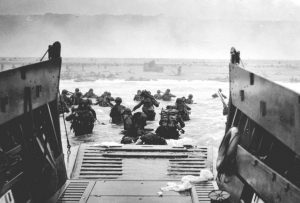 Most people from the Baby Boomer Generation know the significance of D-Day, but it occurs to me that many people in the younger generations may not really know what it was all about. Operation Overlord was the Allied invasion of northern France, commonly known as D-Day. The operation was under the direction of Supreme Allied Commander General Dwight D. Eisenhower. The operation had a brief 3 day window in which to take place, and June 5th had been chosen to be the day, but the day dawned gloomy, so the operation had to be scrubbed for the day.
Most people from the Baby Boomer Generation know the significance of D-Day, but it occurs to me that many people in the younger generations may not really know what it was all about. Operation Overlord was the Allied invasion of northern France, commonly known as D-Day. The operation was under the direction of Supreme Allied Commander General Dwight D. Eisenhower. The operation had a brief 3 day window in which to take place, and June 5th had been chosen to be the day, but the day dawned gloomy, so the operation had to be scrubbed for the day.
Then on June 6th, the orders came down that Operation Overlord was a go. By daybreak, 18,000 British and American parachutists were already on the ground. An additional 13,000 aircraft were mobilized to provide air cover and support for the invasion, among them the B-17, Raggedy Ann, which was carrying my dad, Allen Spencer, who was a Top Turret Gunner and Flight Engineer. At 6:30 am, American troops came ashore at Utah and Omaha beaches. The British and Canadians overcame light opposition to capture Gold, Juno and Sword beaches, as did the Americans at Utah. Omaha beach was a much different situation, however, where the US First Division battled high seas, mist, mines, burning vehicles, and German coastal batteries, including an elite infantry division, which spewed heavy fire. Many wounded Americans ultimately drowned in the high tide. British divisions, which landed at Gold, Juno, and Sword beaches, and Canadian troops also met with heavy German fire.
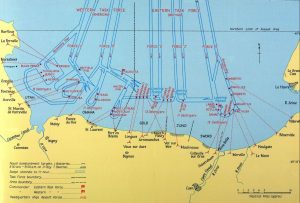
The troops persevered, even though the loses were great, and in the end the operation was declared a victory. There were many reasons that D-Day was successful, even against all odds. The Allies had fooled the Germans, who thought the attack was going to occur farther along the coast at Calais because this was the shortest route by sea, even when the attack began on the beaches Hitler was still convinced the attack was going to occur at Calais. What a shock that must have been when he found out that the attack took place on the beaches of Normandy. False intelligence spread by the allies spread false information to the Germans, and they bought it.
There were many factors that all worked together to make the plan work. Wooden guns on the South Coast of England, wooden planes, dropped plastic dummies out of planes, they put mirrors up on their ships and the Germans were fooled as they saw themselves going the other way. New technology specifically designed for the landing enabled the Allies to gain an advantage over the Germans. Mulberries, the floating docks the Allies used to land, enabled the Allies to land safely and disembark while firing. Some of the beaches were practically empty, however, on Omaha beach the Allies suffered heavy losses numbering 2000 in total. Operation Overlord had been planned for many years and so they were ready. The Germans had to keep control of the other parts of their empires, so their troops were elsewhere. Hitler denied that his forces were losing in Normandy, and 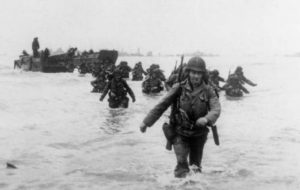 would not authorize the mobilization of forces stationed near Normandy.
would not authorize the mobilization of forces stationed near Normandy.
As for the Allies, the troops involved were highly trained, equipped and motivated. Their battle plan was well prepared. All the necessary manpower and logistics were available to them. The air space was controlled by the Allies. The sea lanes were very short and the seas were in Allied hands. The deception plan was flawless. The Germans had no idea what was coming. The French Resistance was highly effective. The German troop who were there were poorly motivated. Hitler’s Defense Planning was completely flawed. But, the biggest victory is that the troops did their job.
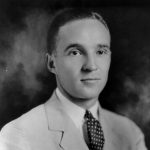
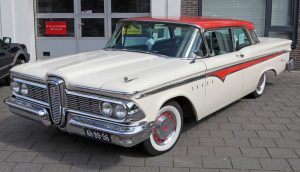 Despite having a domineering father, who was never pleased with anything he did, Edsel Ford, the son of the founder of Ford Motors is mainly remembered for the Edsel, a failed 1958-60 car model. In reality, he was one of the masterminds of the Allied victory in World War II. Against the wishes of his father, Edsel Ford telephones William Knudsen of the U.S. Office of Production Management on June 12, 1940, to confirm Ford Motor Company’s acceptance of Knudsen’s proposal to manufacture 9,000 Rolls-Royce-designed engines to be used in British and United States airplanes. In all, they would build, 9,000 B-24 Liberator bombers, 278,000 Jeeps, 93,000 military trucks, 12,000 armored cars, 3,000 tanks, and 27,000 tank engines, but it was not without a few stumbling blocks. Edsel and Charles Sorensen, Ford’s production chief, had apparently gotten the go-ahead from Henry Ford by June 12, when Edsel telephoned Knudsen to confirm that Ford would produce 9,000 Rolls-Royce Merlin airplane engines (6,000 for the RAF and 3,000 for the U.S. Army). However, as soon as the British press announced the deal, Henry Ford personally and publicly canceled it, telling a reporter: “We are not doing business with the British government or any other government.”
Despite having a domineering father, who was never pleased with anything he did, Edsel Ford, the son of the founder of Ford Motors is mainly remembered for the Edsel, a failed 1958-60 car model. In reality, he was one of the masterminds of the Allied victory in World War II. Against the wishes of his father, Edsel Ford telephones William Knudsen of the U.S. Office of Production Management on June 12, 1940, to confirm Ford Motor Company’s acceptance of Knudsen’s proposal to manufacture 9,000 Rolls-Royce-designed engines to be used in British and United States airplanes. In all, they would build, 9,000 B-24 Liberator bombers, 278,000 Jeeps, 93,000 military trucks, 12,000 armored cars, 3,000 tanks, and 27,000 tank engines, but it was not without a few stumbling blocks. Edsel and Charles Sorensen, Ford’s production chief, had apparently gotten the go-ahead from Henry Ford by June 12, when Edsel telephoned Knudsen to confirm that Ford would produce 9,000 Rolls-Royce Merlin airplane engines (6,000 for the RAF and 3,000 for the U.S. Army). However, as soon as the British press announced the deal, Henry Ford personally and publicly canceled it, telling a reporter: “We are not doing business with the British government or any other government.”
Unlike other automakers, Ford had already built a successful airplane in the 1920s called the Tri-Motor. That fact made them the logical choice when the war effort needed more planes. In two meetings in late May and early June 1940, Knudsen and Edsel Ford agreed that Ford would manufacture the new fleet of aircraft for the RAF on an expedited basis. The one significant obstacle was Edsel’s father Henry Ford, who still retained complete control over the company he founded, even though he had turned the figurehead control over to his son. Henry Ford was well known for his opposition to the possible U.S. entry into World War II, so it would be up to Edsel to convince him that it was necessary.
According to Douglas Brinkley’s biography of Ford, “Wheels for the World,” Henry Ford had in effect already accepted a contract from the German government. The Ford subsidiary Ford-Werke in Cologne was doing business with the Third Reich at the time, which Ford’s critics took as proof that he was concealing a pro-German bias behind his claims to be a man of peace. Nevertheless, as U.S. entry into the war became more of 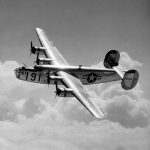
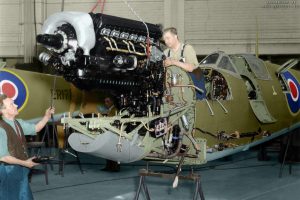 a certainty, Ford reversed his position, and the company opened a large new government-sponsored facility at Willow Run, Michigan in May of 1941, for the purposes of manufacturing the B-24E Liberator bombers for the Allied war effort. Ford Motor plants also produced a great deal of other war materiel during World War II, including a variety of engines, trucks, jeeps, tanks and tank destroyers. The production needs met by Ford Motor Company during World War II were instrumental in the Allied victory in that war.
a certainty, Ford reversed his position, and the company opened a large new government-sponsored facility at Willow Run, Michigan in May of 1941, for the purposes of manufacturing the B-24E Liberator bombers for the Allied war effort. Ford Motor plants also produced a great deal of other war materiel during World War II, including a variety of engines, trucks, jeeps, tanks and tank destroyers. The production needs met by Ford Motor Company during World War II were instrumental in the Allied victory in that war.
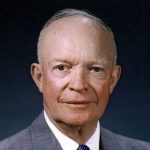
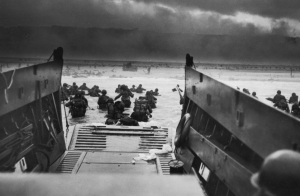 On this D-Day, a subject I have previously written about, I began to wonder about a different side of the story of this age old battle that everyone has heard of, even if some don’t know what it was all about. My thoughts turned to General Eisenhower. It was he who had the unfortunate task of deciding to attack the Germans who were occupying France, by way of the beaches of Normandy, France. It was he who had to carry the emotional burden of knowing that if the attack was made, he would be sending men to die. I would not have wanted to be in his shoes as he pondered this monumental decision. Nevertheless, someone had to make the decision. Things could not go on as they were. The future of the free world was dependent on the decisions made by this one man.
On this D-Day, a subject I have previously written about, I began to wonder about a different side of the story of this age old battle that everyone has heard of, even if some don’t know what it was all about. My thoughts turned to General Eisenhower. It was he who had the unfortunate task of deciding to attack the Germans who were occupying France, by way of the beaches of Normandy, France. It was he who had to carry the emotional burden of knowing that if the attack was made, he would be sending men to die. I would not have wanted to be in his shoes as he pondered this monumental decision. Nevertheless, someone had to make the decision. Things could not go on as they were. The future of the free world was dependent on the decisions made by this one man.
As families listened to their radio stations on the morning of June 6, 1944, one Valerie Lauder, who was 18 at the time, had graduated from Stephens Junior College that May and was not due at Northwestern University and the Medill School of Journalism until September was among the listeners. Her father was listening too, until he had to go to work. She said that President Roosevelt came on the radio and offered a prayer. Then, she heard General Eisenhower’s recorded reading of the order of the day, the troops in LSTs and transports heard it over loudspeakers. At that point, Val decided that she would really like to meet General Eisenhower, and given her chosen profession as a journalist, she was able to eventually make that happen. In fact, she was not only able to meet General Eisenhower 2½ years later, but was also able to preside at his press conference with the student press club that she had created and the Chicago Daily News sponsored.
She related the scene, “On January 18, 1947, Wearing two battle ribbons on his waist-length “Eisenhower jacket,” the supreme commander of the Allied Expeditionary Forces in Europe stood to my left, facing 165 student editors and photographers from high school and college newspapers throughout the greater Chicago area gathered in the Drake Hotel. Dressed in their Sunday best, pencils poised, notebooks open, they were seated on straight-back chairs set out in rows of 10 on either side of a center aisle. Ike stood at the end of the center aisle, about three feet in front of me. I introduced him.” As Val introduced General Eisenhower, she asked him, “General Eisenhower, what was the greatest decision you had to make during the war?” Eisenhower contemplated her question for a moment, and then answered her in a somber and serious tone about the D-Day landings. “To ensure the success of the Allied landings in Normandy,” he explained, “it was imperative that we prevent the enemy from bringing up reinforcements. All roads and rail lines leading to the areas of fighting on and around the beaches had to be cut or blocked. If reinforcements were allowed to reach the areas of fighting there, in our first, precarious attempts to get a foothold on the continent, the whole operation could be jeopardized. The landings might fail. The success of the landings on the beaches,” Ike said, reaching the end of the first row, starting back, “might well turn on the success of the paratroopers behind the lines.”
Then, on May 30, just six days before the scheduled landings, which were to have been June 5, a trusted aide and personal friend came to him, deeply concerned about the airborne landing. Val later that learned it was British Air Chief Marshal Sir Trafford Leigh-Mallory, who had been assigned to the Allied forces, with the title of Air Commander in Chief, which made him the air commander of the Allied invasion. He was apologetic about how late it was, so close to the jump-off time. But, he’d gone over it, and over it, and over it, and felt it simply would not succeed. The casualties would be too great. He pleaded with Eisenhower. “Casualties to glider troops would be 90% before they ever reached the ground,” he said. “The killed and wounded among the paratroopers would be 75%.” Eisenhower knew that would mean an unbearably high percentage of the 18,000 men who would drop into the darkness over Nazi-occupied France would become casualties. This would also mean that the survivors would be too few in number to succeed in their crucial mission of seizing, and holding the causeways. “The man was absolutely sincere, absolutely convinced it wouldn’t work,” Eisenhower said. “As a highly respected, capable officer, I trusted his judgment. I told him I’d think it over.”
After agonizing over the possible losses, he was still undecided just four days before the planned date. Eisenhower slowing, turned to face the students, he said, “I let the order stand.” With the words, his face seemed to relax. I suppose you would have to decide that you were going to be ok with the decision, or else it 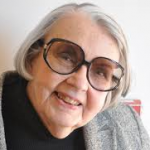
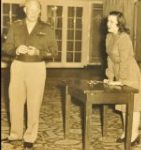 would drive you crazy. The students sat in stunned silence. “The airborne boys did their job.” Eisenhower went on with relief almost bordering on elation. “And, I am happy to say, the casualties were only 8%.” Eisenhower was not just a general setting up a battle, but rather a man with a heartfelt concern for the men in the airborne divisions and the men in the landing craft headed for the beaches. As he put it in his book, Crusade in Europe, “It would be difficult to conceive of a more soul-racking problem.” I have to agree. To only lose 8% of the men in that situation, well that is…unbelievable!!
would drive you crazy. The students sat in stunned silence. “The airborne boys did their job.” Eisenhower went on with relief almost bordering on elation. “And, I am happy to say, the casualties were only 8%.” Eisenhower was not just a general setting up a battle, but rather a man with a heartfelt concern for the men in the airborne divisions and the men in the landing craft headed for the beaches. As he put it in his book, Crusade in Europe, “It would be difficult to conceive of a more soul-racking problem.” I have to agree. To only lose 8% of the men in that situation, well that is…unbelievable!!
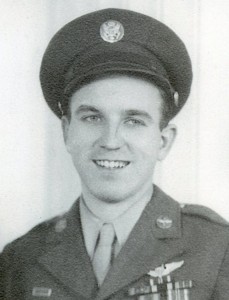 It’s hard for me to think about D-Day, without wondering what things were going through my dad, Allen Spencer’s mind on that day. Each branch of the military had their own part to play and each was in much danger. I suppose it’s possible that the men on the ground were in the most danger, but in reality, anyone who was involved that day faced grave danger. Soldiers could be shot and killed, ships could be sunk, and planes could be shot down. No matter how the attack came, death was often the result, and in battle it was inevitable.
It’s hard for me to think about D-Day, without wondering what things were going through my dad, Allen Spencer’s mind on that day. Each branch of the military had their own part to play and each was in much danger. I suppose it’s possible that the men on the ground were in the most danger, but in reality, anyone who was involved that day faced grave danger. Soldiers could be shot and killed, ships could be sunk, and planes could be shot down. No matter how the attack came, death was often the result, and in battle it was inevitable.
My dad was a young man of just 20 years. That is the age of my two oldest grandchildren, and I simply cannot imagine either of them being in that position. Of course, they could handle it, because twenty year olds have been fighting wars for as long as wars have been fought. It is me, and my mind, that can’t wrap itself around the idea of them being in an airplane providing air support over a battlefield. For my dad, every mission held an adrenalin rush, a degree of excitement, and a large degree of dread, mixed with the need to push back fear. Flying in the B-17G Bomber was an exciting thing for him, but unfortunately it had to 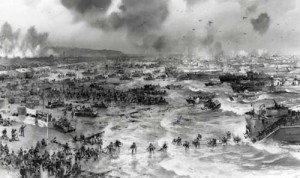 be mixed with the reality of the fact that those bombs were killing people…even if they were the enemy. They often had no say in the matter, they were an enemy of the Allied Forces simply because they lived in the country they did.
be mixed with the reality of the fact that those bombs were killing people…even if they were the enemy. They often had no say in the matter, they were an enemy of the Allied Forces simply because they lived in the country they did.
The air war was vastly different from the ground war, but that didn’t make either more of less dangerous. The Luftwaffe was not widely used on D-Day, but did come racing in over the following days. The weather was bad that first day, and that was definitely to the advantage of the Allied troops. Nevertheless, there were German forces involved, and without air support, they could not have pulled off the victory they did at Normandy. The planes that were there to provide air support, were basically magnets for the 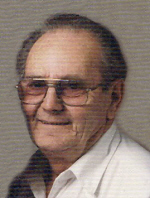 Luftwaffe, and any other enemy forces on the ground. Flying over Normandy was not a task to be taken lightly. Their job was to keep the bombers, tanks, and other soldiers off of the ground troops. The men risked their lives every second that they were in the air. The men on the ground were so vulnerable, and it was imperative that they have good air cover to keep as much enemy fire off of them as possible. It was very clear that without the air support, D-Day would not have been possible.
Luftwaffe, and any other enemy forces on the ground. Flying over Normandy was not a task to be taken lightly. Their job was to keep the bombers, tanks, and other soldiers off of the ground troops. The men risked their lives every second that they were in the air. The men on the ground were so vulnerable, and it was imperative that they have good air cover to keep as much enemy fire off of them as possible. It was very clear that without the air support, D-Day would not have been possible.
I am very proud of the part my dad played in D-Day, as I am of men like my Uncle Jim Wolfe, who was one of those men on the ground on that fateful day. Their job was a very dangerous one, and many of them would not see the sun set that night, but they had a job to do, and so they went out to battle for the freedom of those who were oppressed by the evil that was Hitler. It is a battle we will never forget, nor will we forget the men who fought there, especially those who gave all.
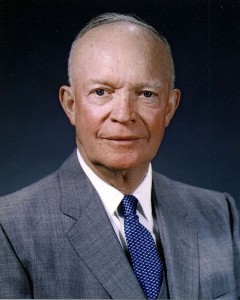 Not all of us can say that we knew a US President, before or during their presidency, but my uncle, Jim Wolfe could say that. Uncle Jim was in the army during World War II, and was on his way to England on a ship. Being the kind of guy who liked to see how things worked, Uncle Jim was laying on the back end of the ship watching the propeller go in and out of the water. Ike came up behind him and asked him if he was sick. Uncle Jim said, “No, I was just watching the prop.” Ike said, “Lord, man I would be so sick it would kill me and I’m on ships all the time.” He told Uncle Jim to come with him and they were going to go to Officers Mess and have coffee. Dad said “I can’t go there I will get in trouble.” Ike informed Uncle Jim that as long as he was with him, they wouldn’t say anything to him.
Not all of us can say that we knew a US President, before or during their presidency, but my uncle, Jim Wolfe could say that. Uncle Jim was in the army during World War II, and was on his way to England on a ship. Being the kind of guy who liked to see how things worked, Uncle Jim was laying on the back end of the ship watching the propeller go in and out of the water. Ike came up behind him and asked him if he was sick. Uncle Jim said, “No, I was just watching the prop.” Ike said, “Lord, man I would be so sick it would kill me and I’m on ships all the time.” He told Uncle Jim to come with him and they were going to go to Officers Mess and have coffee. Dad said “I can’t go there I will get in trouble.” Ike informed Uncle Jim that as long as he was with him, they wouldn’t say anything to him.
In the Officers Mess, Uncle Jim and Ike talked for a long time and then went their separate ways on the ship. When they got to England, Uncle Jim saw him a few times and then on D-Day, they found themselves on the same ship again. When they disembarked, they were under heavy fire, and my cousin Shirley Cameron tells me that Ike got a hold of her dad, my Uncle Jim and asked him how his shooting was. Uncle Jim said that it was good. Ike said, “See that guy in that tree way up there.” Uncle Jim said that he did, and Ike asked if he could hit him. Uncle Jim shot, hit, and killed the man. Ike said for Uncle Jim to stay with him. They were together for quite a while before they got separated. At that point, Uncle Jim was sent to another area.

Uncle Jim ended up opening up some of the concentration camps. That was probably the worst part of his service. He said the men were like the walking dead. They were sick, weak, and skinny. All they could do was grab hold of him and thank him over and over for getting them out of that horrible place. Shirley tells me that he saw little wooden sheds that had bodies stacked from bottom to top, There were also pits that had bodies stacked in them ready for the heavy equipment to push the dirt over the top. She told me that experience gave him nightmares for years. He used to have pictures of all of that and the people that they helped out of the camps, but unfortunately they were lost in the fire that destroyed his home a number of years ago. After his time there, Uncle Jim was sent to France to help with the Liberation there. I’m sure he came home with many stories of the war, but as far as I know, that was the last time he ever saw the man who would later become our 34th US President, Dwight D Eisenhower…aka Ike.
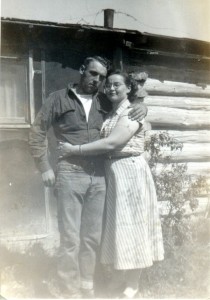 Sixty six years ago, when the bitterly cold winter of 1949 was finally over and spring had finally arrived, my mother-in-law, Joann Knox was a young girl of eighteen, and she was in love. She had known her future husband and the love of her life, Walter Schulenberg, all her life. Still, knowing him didn’t mean they were always in love, or even that they liked each other. Little kids can be friends with someone, and then when they get older, things change. Then, as was the case with my in-laws, things can change again. That annoying teenaged boy or girl suddenly takes on a new look to you. Suddenly, the time is right, and they both wonder why they didn’t see this person this way before. That’s how it was for my in-laws. Grandma Knox, Joann’s mom told me once that after they got older, Mom didn’t like Dad one bit. I would guess that was probably in his bratty adolescent years, when most boys are awkward around girls…especially if they like them at all.
Sixty six years ago, when the bitterly cold winter of 1949 was finally over and spring had finally arrived, my mother-in-law, Joann Knox was a young girl of eighteen, and she was in love. She had known her future husband and the love of her life, Walter Schulenberg, all her life. Still, knowing him didn’t mean they were always in love, or even that they liked each other. Little kids can be friends with someone, and then when they get older, things change. Then, as was the case with my in-laws, things can change again. That annoying teenaged boy or girl suddenly takes on a new look to you. Suddenly, the time is right, and they both wonder why they didn’t see this person this way before. That’s how it was for my in-laws. Grandma Knox, Joann’s mom told me once that after they got older, Mom didn’t like Dad one bit. I would guess that was probably in his bratty adolescent years, when most boys are awkward around girls…especially if they like them at all.
As the years went by, Walt and Joann moved in different circles, and didn’t really see each other very much, but then one day, he noticed her again. My mother-in-law wasn’t too sure how she felt about his new found interest in her, as she still thought of him as a bit of an annoying boy, but if you knew my father-in-law at all, you would know that he had a winning personality, and it was really hard not to like him. That is what my mother-in-law found too. Before long, they were an item. First meeting them after many years of marriage, and meeting them is a more reserved situation…for my mother-in-law at least, I never saw the love struck side of their early relationship. I don’t think their kids really did either. Their love letters, written during the times he was working one place and she another, were tender and sweet. It was such a surprise to see those letters, because they just never seemed to me to be the googly eyed kind of couple, and yet, here in their letters, they were.
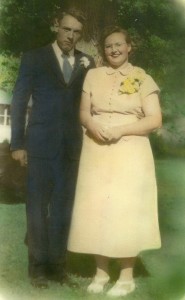
As time passed, their future plans began to grow, and when Joann graduated, they decided to be married. Like their granddaughter, Corrie Petersen, my daughter, they didn’t wait very long after graduation. The wedding took place on the 5th anniversary of D-Day, a fact that I seriously doubt that either of them gave a single thought to…at least not that year. Like many marriages of that time, it was a simple wedding…much like my own parents’ wedding just a few years later. My mother-in-law wore a simple peach colored dress and my father-in-law a suit. Nevertheless, it was for them the perfect day…the culmination of the many years of an on again, off again friendship, now turned to a forever kind of love. Today marks the 66th anniversary of that wedding day, and while my father-in-law has been gone now for two years, my mother-in-law is still alive, and since she does not realize that he is gone, we will still tell her happy anniversary…at the same time that we tell her that Dad is out in the garage working on a car, or at Walmart, or visiting the neighbors, because to tell her he is gone would be just too mean. Happy anniversary to my in-laws, Walt…in Heaven, and Joann, here on Earth. Have a wonderful day. We love you both very much.
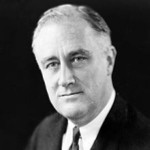
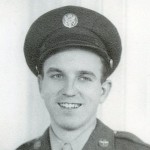 In the height of World War II, on January 14, 1943, President Franklin D Roosevelt made history when he became the first president to travel by airplane on official business. The trip was not without danger. The German U-boats were wreaking havoc on Allied war ships in the Atlantic, and it was decided that a face to face conference was needed to discuss strategy. The man President Roosevelt was going to see, was my fifteenth cousin once removed, Winston Spencer-Churchill. No American President had flown on official business before, but with security in the Atlantic uncertain, Roosevelt’s advisors reluctantly agreed that he should fly. I’m sure his frail health at 60 years of age played a part in their decision too. The secret trip began on January 11, and the plane had to make several stops along the way. They took off from Florida with a first stop in the Caribbean to refuel and allow the president to rest. They then took off and headed south along the South American coast to Brazil, then across the Atlantic to Gambia, finally reaching Casablanca on this day, January 14, 1943.
In the height of World War II, on January 14, 1943, President Franklin D Roosevelt made history when he became the first president to travel by airplane on official business. The trip was not without danger. The German U-boats were wreaking havoc on Allied war ships in the Atlantic, and it was decided that a face to face conference was needed to discuss strategy. The man President Roosevelt was going to see, was my fifteenth cousin once removed, Winston Spencer-Churchill. No American President had flown on official business before, but with security in the Atlantic uncertain, Roosevelt’s advisors reluctantly agreed that he should fly. I’m sure his frail health at 60 years of age played a part in their decision too. The secret trip began on January 11, and the plane had to make several stops along the way. They took off from Florida with a first stop in the Caribbean to refuel and allow the president to rest. They then took off and headed south along the South American coast to Brazil, then across the Atlantic to Gambia, finally reaching Casablanca on this day, January 14, 1943.
It seems strange to us now that they would take such a roundabout route, but things were different then. The Boeing 314 Flying Boat that had been dubbed the Dixie Clipper was a big heavy plane. It had a flight range of 3,500 miles, and the direct route would have been about 4326 miles, making at lease one stop necessary. Since the Secret Service considered air travel for a president as risky anyway, I’m sure they wanted to take a 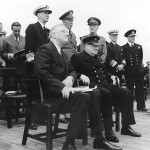 route that would keep them as far away from any fighting as they could. Also, the final leg of the trip required that the group transfer to an Army transport plane. The C-54 was required to fly at 15,000 feet to cross the Atlas Mountains…an altitude that seems insignificant today, but must have been quite high then. The Secret Service personnel and FDR’s advisors were worried about the oxygen levels affecting the president, and in the end, he did have to go on oxygen for a time during that part of the flight.
route that would keep them as far away from any fighting as they could. Also, the final leg of the trip required that the group transfer to an Army transport plane. The C-54 was required to fly at 15,000 feet to cross the Atlas Mountains…an altitude that seems insignificant today, but must have been quite high then. The Secret Service personnel and FDR’s advisors were worried about the oxygen levels affecting the president, and in the end, he did have to go on oxygen for a time during that part of the flight.
The flight was mastered successfully, and the two men were safely tucked into the Anfa Hotel where Roosevelt and Churchill were both in suites that were close together, making it the perfect place for the conference to take place…after the rooms were cleared of listening devises that had been planted by unknown persons, that is. The advisors and chiefs of staff did most of the hard work of the negotiations, but the presence of Roosevelt and Churchill kept them on task and working toward an agreement. The conference was very important to both sides, as the British were being hit very hard, and Roosevelt needed to keep the American troops advancing and winning their battles, so he could demonstrate to the American people that the tide of this war was turning. People get weary of war quite quickly, and in order to keep their support, victory in battle is key.
The Casablanca Conference was looked at by some as a victory for the British negotiators, because Churchill’s strategy prevailed, but they had missed the fact that the Americans also gained British commitments to long-term goals that went beyond the immediate objectives in the Mediterranean. The Americans agreed to attack Sicily after the victory in North Africa and the British agreed to allow a massive buildup of Allied Forces in 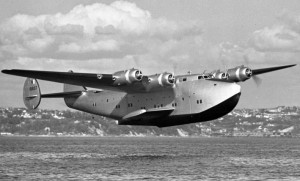 Britain, which would allow for an invasion of France with a target date of May 1, 1944. The invasion actually took place on June 6, 1944, and would become a day we all know as D-Day, when the troops stormed the beaches of Normandy…and that is where my dad came in. Since he was one of the Allied Forces that was stationed in England, his B-17G Bomber was one of those that provided cover for that invasion. It seems quite strange to me that a conference that took place over a year before, and 2 months prior to my dad’s enlistment, would ultimately place him in a position to fight in one of the most well known battles of World War II.
Britain, which would allow for an invasion of France with a target date of May 1, 1944. The invasion actually took place on June 6, 1944, and would become a day we all know as D-Day, when the troops stormed the beaches of Normandy…and that is where my dad came in. Since he was one of the Allied Forces that was stationed in England, his B-17G Bomber was one of those that provided cover for that invasion. It seems quite strange to me that a conference that took place over a year before, and 2 months prior to my dad’s enlistment, would ultimately place him in a position to fight in one of the most well known battles of World War II.
 My children and grandchildren have always known that my dad fought in World War II, but I find that maybe they don’t fully know what his part was, or how I feel about it. That is not surprising when you think about the fact that my children, grandchildren, and indeed, even my sisters and I, were not even born when all that took place seventy years ago today. I am pleased that my grandchildren know that their great grandpa fought in World War II, because that tells me that we who are older and at least know about that time in history, have done our jobs, in teaching this youngest generation of our family about the history their family was involved in…pretty well anyway. I was also very proud of my grandson, Chris, because he was interested enough to ask the questions he did about his great grandpa’s service years.
My children and grandchildren have always known that my dad fought in World War II, but I find that maybe they don’t fully know what his part was, or how I feel about it. That is not surprising when you think about the fact that my children, grandchildren, and indeed, even my sisters and I, were not even born when all that took place seventy years ago today. I am pleased that my grandchildren know that their great grandpa fought in World War II, because that tells me that we who are older and at least know about that time in history, have done our jobs, in teaching this youngest generation of our family about the history their family was involved in…pretty well anyway. I was also very proud of my grandson, Chris, because he was interested enough to ask the questions he did about his great grandpa’s service years.
This morning, my grandson Chris sent me a text, tip toeing a bit, because he didn’t know how I 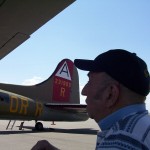 would feel talking about this part of me Dad’s life, and asked me if my dad was involved in the D-Day maneuvers. I immediately told him that I was very proud of the part my Dad had played in World War II, and that his squadron had provided air cover as the troops stormed the beaches of Normandy. I sent him the links to other stories I had written about my Dad’s World War II service years, and he was amazed at all his great grandpa had done. I know how he feels. The first time I was told about all the things my dad had done, I was amazed too…and very proud.
would feel talking about this part of me Dad’s life, and asked me if my dad was involved in the D-Day maneuvers. I immediately told him that I was very proud of the part my Dad had played in World War II, and that his squadron had provided air cover as the troops stormed the beaches of Normandy. I sent him the links to other stories I had written about my Dad’s World War II service years, and he was amazed at all his great grandpa had done. I know how he feels. The first time I was told about all the things my dad had done, I was amazed too…and very proud.
There are a number of men, and maybe even women, in our family who served their country in World War II, and were involved in D-Day maneuvers, and each one is a hero in my eyes. This was such an important day in our history, as was the war it was a part of, and I would hate to think that our grandchildren and great grandchildren would never know of the sacrifice those brave men  made. I would hate to think that the heroes of this and other wars would be forgotten by a nation too busy with their own lives and interests to take the time to look back in history and see for themselves exactly what took place. I know many people find history to be dull, dry, and boring in school, but as we age, and experience a few wars, weather events, earthquakes, and other changes in our nation, we realize that maybe we really need to take a look back and see just how we came to be the great nation we are…and remember the sacrifices made by so many to get us where we are today. I want to thank all the men and women who took part in D-Day, World War II, and all the other wars our nation has been a part of. We are great because of God and you!!
made. I would hate to think that the heroes of this and other wars would be forgotten by a nation too busy with their own lives and interests to take the time to look back in history and see for themselves exactly what took place. I know many people find history to be dull, dry, and boring in school, but as we age, and experience a few wars, weather events, earthquakes, and other changes in our nation, we realize that maybe we really need to take a look back and see just how we came to be the great nation we are…and remember the sacrifices made by so many to get us where we are today. I want to thank all the men and women who took part in D-Day, World War II, and all the other wars our nation has been a part of. We are great because of God and you!!
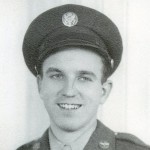 I spent last evening at my mom’s going through some of my dad’s things. We looked at his old report cards, and autograph book from his school days, a hat I had seen him wear in a picture when he was about 2, a New Testament Bible given to him in the service, his Army Air Force uniforms, and a some miscellaneous other things. It has been 3 1/2 years since my dad went home to be with the Lord. This was hard in many ways, but it was time to do it.
I spent last evening at my mom’s going through some of my dad’s things. We looked at his old report cards, and autograph book from his school days, a hat I had seen him wear in a picture when he was about 2, a New Testament Bible given to him in the service, his Army Air Force uniforms, and a some miscellaneous other things. It has been 3 1/2 years since my dad went home to be with the Lord. This was hard in many ways, but it was time to do it.
One of the most precious things we came across, was the letters my dad wrote home to his mom during World War II. It looks like she must have kept every one of them, and they are neatly tied together in a bundle, so they would be safe through the years. What a treasure!! Dad was always the kind of person who would give you the shirt off his back if you needed it. He talked to his mom about the money he sent home to the family every paycheck, and the fact that since he didn’t need much money, he was going to be buying a war bond each paycheck too, and would be sending that home to go toward a savings for his future. He said that he figured he could have a nice nest egg by the time he came home by doing that. Then he told his mom that if she found that she needed money, she was suppose to use those bonds, “even if she used them all, because he expected that there would be plenty of ways to make money after the war, if a fellow was willing to work” so he would be just fine. It was so important to him that his mom and family at home were ok. That is how my dad always was. He always put others first, especially his family, even if it meant working extra hours or a second job.
Dad tried to reassure his mom that he would come home safely. He spoke of the brand new plane, a brand new B-17 Bomber, that had been assigned to him and his crew. You could hear the excitement in the words he had written, as if he has spoken them to you himself. The plane flew “so smoothly” and “you can see why they call it the flying fortress” were the words he used to describe the new plane. He loved the beautiful new plane, but at the same time, he was well aware of what he was going to be flying into. He had hoped for a furlough before he was sent overseas, but it was not to be, and he didn’t know where he was to be stationed yet, but he didn’t want his mom to worry about it. He was flying off into an uncertain future, and not sure of his return, and yet his concern was for his mom and her feelings. That was just how he was. He assured her in a determined 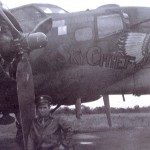 tone, that he would “return home in the same condition as he left” and would be protected in the plane that was built to be the “dread of the airways” during the war and because God would watch over him to bring him home; and so He did.
tone, that he would “return home in the same condition as he left” and would be protected in the plane that was built to be the “dread of the airways” during the war and because God would watch over him to bring him home; and so He did.
My dad would spend the rest of the war stationed in Great Ashfield, Suffolk, England, and would serve many successful missions in the plane that he was so pleased with. He would be decorated for his success in shooting down enemy planes and for successful air cover, including covering the storming of the beaches of Normandy on D-Day. He had many adventures during that time, but from his letters, it was clear that his heart was always yearning for home and his family.

